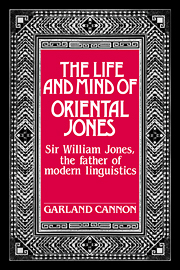Book contents
- Frontmatter
- Contents
- Preface
- Introduction
- Chronology of Jones's Life
- 1 A Barbaric Oriental Conqueror (to 1770)
- 2 Delicate Arab Maidens and Liquid Ruby (1770–1772)
- 3 Persian Jones and Constitutional Law (1772–1777)
- 4 The Athenian and Eleutherion (1778–1780)
- 5 An Ass Laden with Gold (1780)
- 6 Politics: Writings and Activism (1780–1782)
- 7 James River Property (1782–1783)
- 8 A Vision in the Indian Ocean (1783–1785)
- 9 A Sacred Oriental Language (1785)
- 10 A Genetic Explanation: Indo-European (1786–1787)
- 11 Sanskrit Literary Treasures (1787–1788)
- 12 An Indian Renaissance (1789)
- 13 A Burning Tropical Sun (1790–1791)
- 14 Scholar-Martyr (1791–1794)
- 15 Jones Today
- Appendix Five New Letters by Jones
- Notes
- Selected Bibliography
- Index
1 - A Barbaric Oriental Conqueror (to 1770)
Published online by Cambridge University Press: 11 September 2009
- Frontmatter
- Contents
- Preface
- Introduction
- Chronology of Jones's Life
- 1 A Barbaric Oriental Conqueror (to 1770)
- 2 Delicate Arab Maidens and Liquid Ruby (1770–1772)
- 3 Persian Jones and Constitutional Law (1772–1777)
- 4 The Athenian and Eleutherion (1778–1780)
- 5 An Ass Laden with Gold (1780)
- 6 Politics: Writings and Activism (1780–1782)
- 7 James River Property (1782–1783)
- 8 A Vision in the Indian Ocean (1783–1785)
- 9 A Sacred Oriental Language (1785)
- 10 A Genetic Explanation: Indo-European (1786–1787)
- 11 Sanskrit Literary Treasures (1787–1788)
- 12 An Indian Renaissance (1789)
- 13 A Burning Tropical Sun (1790–1791)
- 14 Scholar-Martyr (1791–1794)
- 15 Jones Today
- Appendix Five New Letters by Jones
- Notes
- Selected Bibliography
- Index
Summary
Jones's parents were remarkable people. Jones's father William is remembered for his personality, entrepreneur's role in promoting contemporary British science, and association with the Royal Society. William's own mother, Elizabeth Rowland, was related to the antiquarian Lewis Morris in a line back to Hwfa ap Cynddelw, one of the fifteen tribes of North Wales. John George, his father, was a small farmer in Llanfihangel, Anglesey, where William was born in 1674 or 1675. When his family moved to Tyddyn Bach, Llanbabo, he did so well in a charity school that the landlord Viscount Bulkeley arranged for him to go to London. William worked in the counting house of a merchant, for whom he visited the West Indies. Next he was a mathematics teacher aboard a warship. Present at the conquest of Vigo in 1702, he plundered only some scissors from a bookshop. Upon his return to London he set out his shingle as a mathematics teacher.
William Jones's first book, A New Compendium of the Whole Art of Practical Navigation (London, 1702), was dedicated to the mathematician John Harris, F.R.S., in whose house he had composed this application of plane trigonometry to Mercator's and middle-latitude sailing. The 102 pages of examples and problems supply practical rules for the sailing of ships. Synopsis Palmariorum Matheseos: Or, a New Introduction to the Mathematics (London, 1706) brought William to prominence. This beginner's syllabus explains the principles of arithmetic and geometry, and also discusses conic sections, the laws of motion, and gunnery theory.
- Type
- Chapter
- Information
- The Life and Mind of Oriental JonesSir William Jones, the Father of Modern Linguistics, pp. 1 - 31Publisher: Cambridge University PressPrint publication year: 1991



